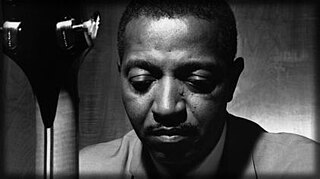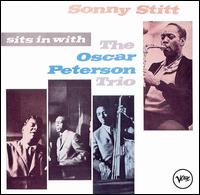Related Research Articles

Maxwell Lemuel Roach was an American jazz drummer and composer. A pioneer of bebop, he worked in many other styles of music, and is generally considered one of the most important drummers in history. He worked with many famous jazz musicians, including Clifford Brown, Coleman Hawkins, Dizzy Gillespie, Charlie Parker, Miles Davis, Duke Ellington, Thelonious Monk, Abbey Lincoln, Dinah Washington, Charles Mingus, Billy Eckstine, Stan Getz, Sonny Rollins, Eric Dolphy, and Booker Little. He was inducted into the DownBeat Hall of Fame in 1980 and the Modern Drummer Hall of Fame in 1992.

Gerald Joseph Mulligan, also known as Jeru, was an American jazz saxophonist, clarinetist, composer and arranger. Though primarily known as one of the leading jazz baritone saxophonists—playing the instrument with a light and airy tone in the era of cool jazz—Mulligan was also a significant arranger, working with Claude Thornhill, Miles Davis, Stan Kenton, and others. His pianoless quartet of the early 1950s with trumpeter Chet Baker is still regarded as one of the best cool jazz groups. Mulligan was also a skilled pianist and played several other reed instruments. Several of his compositions, such as "Walkin' Shoes" and "Five Brothers", have become standards.

Edward Hammond Boatner Jr., known professionally as Sonny Stitt, was an American jazz saxophonist of the bebop/hard bop idiom. Known for his warm tone, he was one of the best-documented saxophonists of his generation, recording more than 100 albums. He was nicknamed the "Lone Wolf" by jazz critic Dan Morgenstern because of his relentless touring and devotion to jazz yet rarely worked with the same musicians for long. Stitt was sometimes viewed as a Charlie Parker mimic, especially earlier in his career, but gradually came to develop his own sound and style, particularly when performing on tenor saxophone and even occasionally baritone saxophone.
Leroy Vinnegar was an American jazz bassist. Born in Indianapolis, Indiana, United States, the self-taught Vinnegar established his reputation in Los Angeles, California, during the 1950s and 1960s. His trademark was the rhythmic "walking" bass line, a steady series of ascending or descending notes, and it brought him the nickname "The Walker". Besides his jazz work, he also appeared on a number of soundtracks and pop albums, notably Van Morrison's 1972 album, Saint Dominic's Preview.
"Lover" is a popular song composed by Richard Rodgers with lyrics by Lorenz Hart. It was sung in the movie Love Me Tonight (1932) by Jeanette MacDonald.

Rhythm changes are a common 32-bar chord progression in jazz, originating as the chord progression for George Gershwin's "I Got Rhythm". The progression is in AABA form, with each A section based on repetitions of the ubiquitous I–vi–ii–V sequence (or variants such as iii–vi–ii–V), and the B section using a circle of fifths sequence based on III7–VI7–II7–V7, a progression which is sometimes given passing chords.
Adolph Stanley Levey known professionally as Stan Levey was an American jazz drummer. He was known for working with Charlie Parker and Dizzy Gillespie in the early development of bebop during the 1940s, and in the next decade had stint with bandleader Stan Kenton. Levey retired from music in the 1970s to work as a photographer.

Frederick William Green was an American swing jazz guitarist who played rhythm guitar with the Count Basie Orchestra for almost fifty years.
"I'll Remember April" is a popular song and jazz standard about a romantic relationship ending. The lyric uses the seasons of the year metaphorically to illustrate the growth and death of a romance. The lyric also uses the ideas of the hours in a day and the flames of a fire to illustrate a relationship growing stronger and subsequently losing strength. Another interpretation is the use of spring to express the loves that were had in youth and remember them when the autumn of life arrives with affection and nostalgia, smiling: "I'll remember April and I smile". The song has been described as one which makes use of nostalgia, with music written in 1941 by Gene de Paul, and lyrics by Patricia Johnston and Don Raye. It made its debut in the 1942 Abbott and Costello comedy Ride 'Em Cowboy, being sung by Dick Foran.

Irving Sidney "Duke" Jordan was an American jazz pianist.
"All the Things You Are" is a song composed by Jerome Kern with lyrics written by Oscar Hammerstein II.
"Ornithology" is a jazz standard by bebop alto saxophonist Charlie Parker and trumpeter Benny Harris.
This is a discography of the Jazz trombonist J. J. Johnson.

Sonny Stitt Sits in with the Oscar Peterson Trio is a 1959 album by Sonny Stitt, accompanied by the Oscar Peterson trio.
"Billie's Bounce" is a jazz composition written in 1945 by Charlie Parker in the form of a 12 bar F blues. Some sources claim that the song was dedicated to Dizzy Gillespie's agent, Billy Shaw, although according to Ross Russell, Shaw's "name was misspelled" accidentally. However, others claim that the song was in fact dedicated to Shaw's secretary, who was called Billie. The original recording by Charlie Parker and His Re-Boppers was inducted into the Grammy Hall of Fame in 2002.
"Everything Happens to Me" (1940) is a pop standard written by Tom Adair (lyrics) and Matt Dennis (music). It was first recorded by the Tommy Dorsey Orchestra featuring Frank Sinatra. Unusually, the song focused on Sinatra's vocal, with no trombone solo by Dorsey. Years later, Sinatra rerecorded the song with the Hollywood String Quartet; this version was featured on his 1957 album Close to You.

Stitt Plays Bird is an album by American jazz saxophonist Sonny Stitt, recorded in 1963 and issued on Atlantic Records in 1964. As the title suggests, it was recorded as a homage to the legendary saxophonist Charlie Parker, who was nicknamed "Bird."

Gerry Mulligan Meets Stan Getz is an album by American jazz saxophonists Gerry Mulligan and Stan Getz featuring performances recorded in 1957 released on the Verve label.
Jim Hall was an American jazz guitarist, composer, and arranger. His discography consists of 39 studio albums, 10 live albums, 1 EP, 1 single, 10 videos, and 22 compilations, all released between 1957 and 2016. In addition, he was a sideman on numerous albums by other artists.
References
- ↑ Leppanen, Rick. "Jazz Standards Songs and Instrumentals (Honeysuckle Rose)". JazzStandards.com. Retrieved 2010-01-08.
- 1 2 3 4 5 Gioia, Ted (2012). The Jazz Standards: A Guide to the Repertoire. New York City: Oxford University Press. pp. 361–362. ISBN 978-0-19-993739-4.
- ↑ "Our Man in Paris - Dexter Gordon | Songs, Reviews, Credits | AllMusic". AllMusic .
- ↑ Yanow, Scott. "Jim Hall: Jim Hall Live!". AllMusic. Retrieved October 11, 2022.
- ↑ Garratt, John (March 5, 2018). "'Aftter the Fall' Chronicles Keith Jarrett's Late '90s Return to the Stage". PopMatters. Retrieved October 11, 2022.
- ↑ "Complete Dial Sessions - Charlie Parker | Songs, Reviews, Credits | AllMusic". AllMusic .
- ↑ "Stitt Plays Bird - Sonny Stitt | Songs, Reviews, Credits | AllMusic". AllMusic .